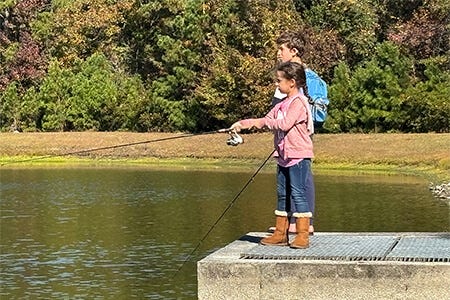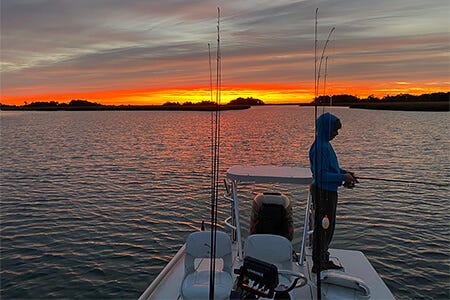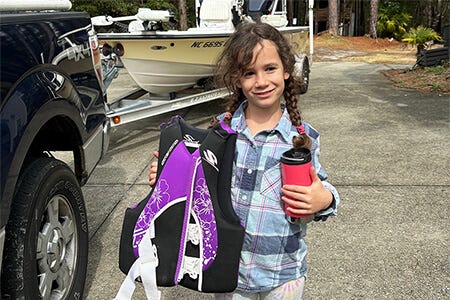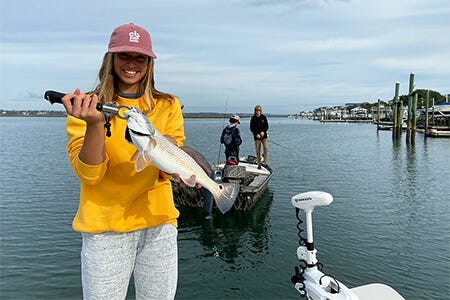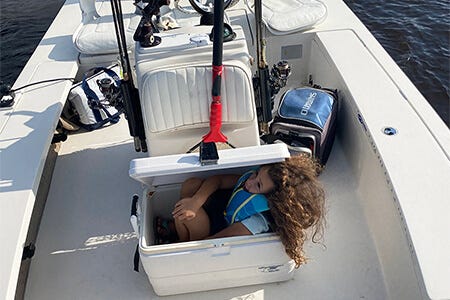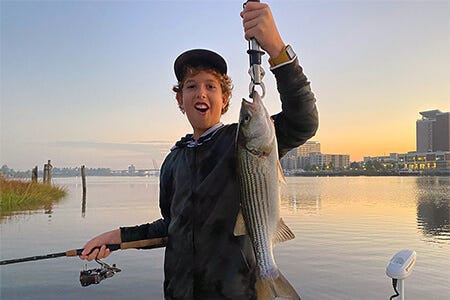

Most of us can’t take full credit for our love of the passions that we pursue. Somewhere along the way, someone in our lives took the time to inspire us. Whether it was a parent, relative, coach or neighbor, someone had that unique ability to help us see magic where we hadn’t previously noticed it.
If you are reading this article, you probably have a passion for boats, or fishing, or both. And if you can thank someone from your early years for that passion, you also likely have a desire to pay that gift forward to the next generation. Whether that next generation is your own child, a niece or nephew, or even just a local kid who needs a little guidance, the joy of passing along the “magic” is even finer than the joy of experiencing it the first time yourself.
Sharing Your Passion
I’m fortunate enough to be the father of five children. My interest in boats and fishing borders on unhealthy addiction, and frequently sits on the wrong side of that particular boundary. I would be lying to suggest that my desire to instill my passion for water-born activities in my children was purely altruistic.
I realized early in my parenting years that teaching those all-important life-lessons to my children would be infinitely more fun on my boat than it would be at someone else’s soccer field. It also didn’t take a mental giant to realize that if my kids loved what I loved, I could do it more often. I figured that if they were going to find an interest in something, why not make it something I could enjoy with them?
My oldest three children share my passion for boats and fishing, and those two loves are the axis that our family revolves around.
That mission seemed pretty simple and straightforward when the babies were in diapers, without strong opinions about how they spent their time, but as they grew older, things got more … complicated. True to form, I went about things all wrong from the beginning, but somehow, as my children have grown older, I’ve witnessed the infection take hold.
My oldest three children share my passion for boats and fishing, and those two loves are the axis that our family revolves around.
As our youngest two make their journey through adolescence, I find myself attempting to replicate what I did for the older two.
It’s a messy process, and I am forced to admit that I’m still figuring it all out. If you find yourself in a similar position, here are a few tips that I learned along the way.
Short, Simple and Active
In my younger years, a “short” fishing trip was eight hours and a good one extended beyond the 12-hour mark. When kids came into the picture, I realized that shorter trips would be more appropriate, but I far overestimated what “short” meant. Four hours is not “short” to a child. Having watched several toddlers intentionally attempt to drown themselves to stave off mind-numbing boredom, I eventually learned what “short” really meant.
For kids under 10, an hour or two of actual fishing is about the maximum they can enjoy, even when the fishing is active. There’s a magic age somewhere between 10 and 12 (earlier for girls, later for boys) where they take a massive leap, and longer trips become enjoyable.
I know all of this now, being older and wiser, and someday in the future, I intend to put that knowledge into practice. Until then, it’s still four-hour trips with baby gates on the gunnels …
It's Not About Catching Fish
My wife frequently reminds me that I put too much focus on catching fish when I take the kids out, and I know that she is right. As counter-intuitive as it may seem, kids don’t actually care about catching fish.
Bobbers and bait seem like a surefire approach for giving a kid a great fishing trip.
After all, bream are both stupid and plentiful, and we all know that given enough time they will eventually cooperate.
However, having attempted that path more times than I’ll openly admit, I’ve come to the conclusion that young kids simply don’t enjoy sitting around and waiting for something to happen, no matter how exciting that “something” might be when it does.
I’ve come to the conclusion that young kids simply don’t enjoy sitting around and waiting for something to happen, no matter how exciting that “something” might be when it does.
My advice? Swap out that bobber with a Beetle Spin and make the trip about learning to cast and retrieve. When the focus of the trip is about something that a child can control (casting distance and accuracy), any fish that is stupid enough to bite is a massive bonus, not a requirement. There is certainly a need to teach children patience, but maybe save that lesson for after they have mastered the active stuff.
It finally occurred to me that what my kids really cared about was what they thought I cared about.
As you are probably beginning to realize, I’m not the sharpest tool in the shed. I often think that maybe the reason I have five kids is because God knew I needed that many tries to finally start figuring things out. Somewhere after child number three (or was it four?), I had a major “Eureka!” moment. It finally occurred to me that what my kids really cared about was what they thought I cared about.
When they thought I wanted to catch fish, they based the trip’s success on catching fish. When I made the trip about learning new skills — and the overall experience of being together — they valued that instead. I figure that with another five kids or so, I’ll have this whole thing figured out and maybe write an even better version of this article. Stay tuned for that.
It's About the Experience, Stupid
When I think back on what made me the rabid, hopeless fishing addict that I’ve proudly become, I can’t trace the outcome to a “prize catch” or a particularly productive trip. What I do remember are the trips with my dad on his sailboat at Lake Grapevine in Texas. Preparing the boat for a trip, he somehow made boating seem important, unusual, and an activity that had a unique language, smells and sensations.
I remember catching a fish for the first time with him off the back of that sailboat on a chunk of hot dog, and I remember playing with that fish in a bucket for hours with no interest or need to catch any more. It wasn’t a single event, but the broad combination of many experiences. I don’t think I am unique in that regard. I’ve asked a lot of fishing buddies how they found their passion. The details are different, but the story is the same.
Now, when I take my younger children fishing, I try to remember to focus their attention on the things that really matter: the color of the sunrise over the water, an unusual bird or animal on the shore, the pungent smell of the salty air at low tide.
I am always amazed at how, over the course of several trips, I find my kids echoing back to me the very things I first pointed out to them.
I hear them telling their mom or their friends all about the things that I’d called their attention to. In a child’s mind, a crab swimming by under the boat has equal value to a trophy catch.
Sweet, Sweet Traditions
Children love traditions. I suspect that, particularly for a young child, everything they experience is new and exciting, but when everything is always “new and exciting,” it’s probably also a little stressful. Repetition is comfort for a child. It’s something that can be anticipated, predicted and known to be safe. Traditions, by definition, are repetitive events, and when those traditions revolve around new adventures, they sweeten the overall experience. It seems to me that the most cherished traditions have two things in common: frequent repetition, and a good marketing campaign.
Many of the traditions that began with my older children were born accidentally.
Most stemmed from a period of time when we had to drive two hours to get to my favorite summer fishing spots.
These runs required a 4 a.m. departure, something more intelligent parents may have realized kids are allergic to.
Oblivious to the damage I was likely inflicting, I simply bribed my kids with coffee for the drive.
You’d be surprised by how excited a seven-year-old can get about fishing when they are hyped up on caffeine and trapped in a car for two hours. Unsurprisingly, coffee quickly established itself as a sacred tradition in all of our early morning trips. Frequent bathroom stops did too, but that’s a story my wife would tell me is inappropriate for this particular article.
You’d be surprised by how excited a seven-year-old can get about fishing when they are hyped up on caffeine and trapped in a car for two hours.
Crafting More Traditions Along the Way
Other traditions were formed on those same trips, usually out of necessity or laziness on my part. I wanted to keep the kids out long enough to justify the drive, so when we stopped for gas, I bought a few “king-sized” candy bars to give them something to look forward to. This, too, became a sacred tradition, right down to the brand and size. After these trips, we stopped by the same fast-food restaurant, because it was both convenient and the only sanitary option. Little did I know that these accidental, repetitive actions would quickly become hallowed rituals that the kids relished at least as much as — and often more than — the actual objective of the mission.
Significantly older and marginally wiser now, I have become more deliberate about forming these kinds of traditions.
Many of these more deliberate traditions revolve around more educational elements.
We have “pre-trip” traditions for getting equipment ready, rigging rods and packing food.
We have particularly rigid traditions to get the boat ready — and each child has their own “mission-critical” function.
Traditions add romance and excitement to the trips, and they simultaneously teach the kids the value of discipline, routine and reliability.
We have food traditions (God forbid I forget to pack the king-sized Snickers bars). We have traditions while fishing, usually superstitious, like never, ever thinking about eating a fish until it’s in the live well. And we have post trip traditions — places to eat, how we clean and put the boat away, etc. These traditions add romance and excitement to the trips, and they simultaneously teach the kids the value of discipline, routine and reliability. When the fish aren’t cooperative, the routines often save the day.
The Treasure Chest
When my oldest two children were very young, I learned the true value of a well-stocked tackle box, and it wasn’t what I thought it would be. As usual, I tripped over this little knowledge-nugget quite by accident. It was on one of those early trips, before I learned that six-hour fishing trips might be sub-optimal in the minds of two young children, with or without king-sized Snickers bars.
Having failed in their earlier attempts to hurl themselves overboard out of boredom, they attempted to explore the contents of my tackle box.
Envisioning the result of explaining to my wife why her progeny were in the emergency room for multiple hook removals, I quickly declared the box off limits.
This declaration was met with several more drowning attempts in protest, but a curious event changed the course of history.
Having done battle with a particularly toothy lizardfish during the discussion, I casually tossed a mangled soft plastic lure into the cockpit of the boat, intending to clean it up later. The reaction was immediate, violent and akin to throwing a chicken bone between two starving dogs. An epic battle erupted immediately as the children dove for their prize.
Shocked by the sudden turn of events, but not too stupid to recognize the potential, I quickly pulled out a second soft plastic and restored peace to the universe.
For the next two hours, those kids entertained themselves with their new treasures, which at times were treated as pampered pets and others were violently ripped to shreds amidst a cacophony of laughter.
It should be noted that properly formulated soft plastics will hypnotically roll down the vertical surface of a fiberglass console and mesmerize children under the age of 10 long enough to hit a couple extra spots before going home.
A Gift that Gives Back
Whatever your relationship to the next generation — whether parent, uncle, aunt or friend — you have a unique opportunity to pass along your passion. Most of us can remember well the person that passed it along to us, and although we may remember that person doing everything “right,” it’s just as likely they did it all wrong. What matters is that they kept at it, and it is natural that we would want to pay the favor forward.
It’s a gift that gives back, and I’ve discovered that in sharing my love for the water with my kids, they have helped me re-see it through the eyes of a child, with all the magic and wonder that I’d forgotten to notice after so many desensitizing decades. Now, for the second time, I get to see this world as a child does. For them, it is a place full of mystery and wonder, often overwhelming and frightening, but one that, with the right guide, can be learned, loved and passed along to future generations. Short, active trips, with a focus on the experience instead of the quarry, and rich in traditions, will create a love that lasts multiple lifetimes.


